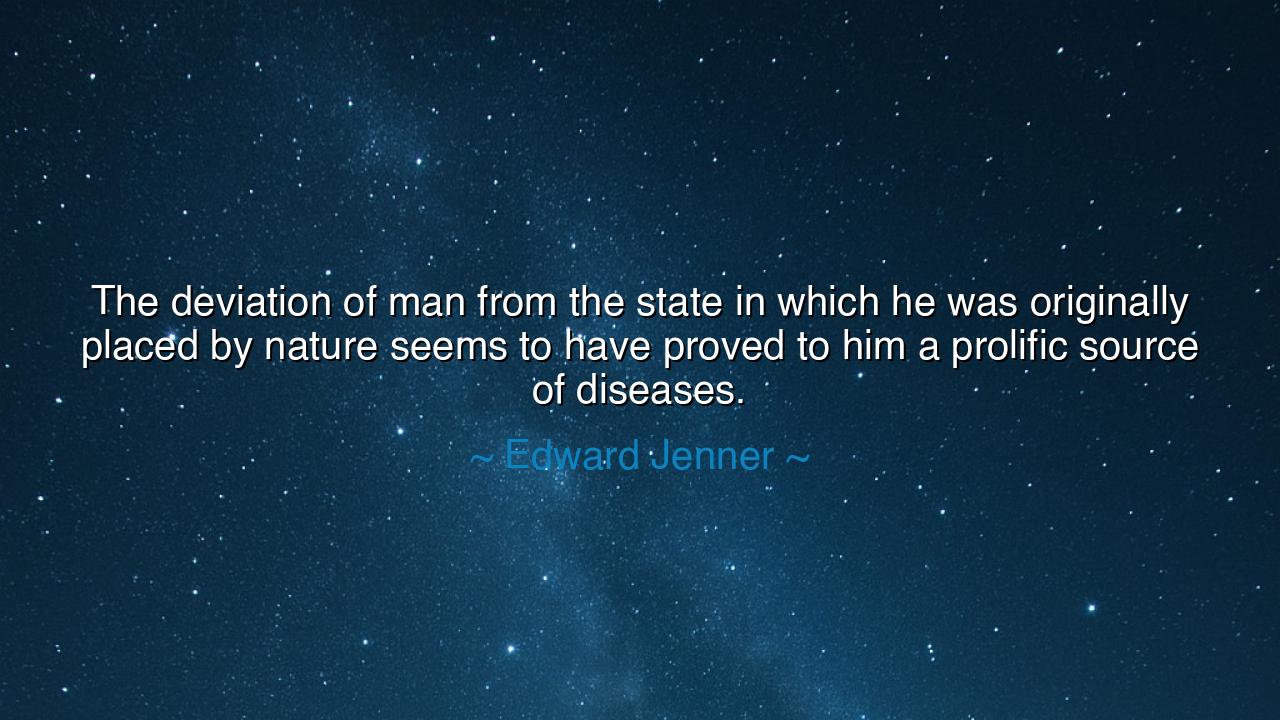
The deviation of man from the state in which he was originally
The deviation of man from the state in which he was originally placed by nature seems to have proved to him a prolific source of diseases.






In the solemn wisdom of Edward Jenner, the healer who first unlocked the secret of vaccination, we hear a reflection on the fragile bond between humanity and the natural order: “The deviation of man from the state in which he was originally placed by nature seems to have proved to him a prolific source of diseases.” This is not merely the observation of a physician but the lament of one who looked deeply into the patterns of life and saw how far man had strayed from the harmony of his beginning. It is a warning wrapped in truth—that when we step away from the balance ordained by nature, we invite suffering into our very flesh.
Jenner lived in an age when smallpox ravaged the earth, a plague that claimed countless lives and scarred the faces of survivors. In his quest to understand disease, he observed that those who worked close to the rhythms of nature—milkmaids exposed to cowpox—were strangely spared. From this simple but profound observation came the great breakthrough of vaccination. And yet, even as he offered healing, Jenner spoke these words, recognizing that many of humanity’s afflictions arose from its separation from the natural life, from excess, from artificiality, from rebellion against the earth’s original design.
To speak of man’s deviation is to recall that our ancestors once lived close to the land, eating what the soil provided, moving in step with the seasons, breathing air untainted. But as men pursued luxury, wealth, and the comfort of cities, they also gathered sicknesses. Crowded dwellings bred plagues, altered diets bred weakness, polluted air bred fevers. The very advancements man praised often carried hidden chains of disease. Jenner’s words shine a light on this irony: that in seeking to master nature, man had instead enslaved himself to new forms of suffering.
History confirms this truth. When European explorers carried their ways of living into the New World, they also carried diseases that devastated indigenous peoples—illnesses born not of malice but of the vast changes in how societies had diverged from nature’s first order. Where once small bands roamed freely in balance, now vast populations lived in dense settlements, birthing new ailments as if from the womb of civilization itself. Thus, Jenner’s reflection speaks not only of his own time but of all time, for every age wrestles with the cost of its distance from the natural path.
Yet his words are not only a lament but a call to wisdom. To acknowledge that nature was the first physician is to seek reconciliation with her. This does not mean retreating into wilderness, but remembering that health is harmony—harmony with food that nourishes rather than poisons, with air that refreshes rather than chokes, with rhythms of labor and rest that mirror the rising and setting of the sun. Man cannot live without progress, but neither can he thrive when progress blinds him to his origins.
The lesson here is profound: if we would avoid the “prolific source of diseases,” we must not war against nature but walk beside her. Our bodies are not machines separate from the earth; they are of the earth, bound to her laws. Ignore them, and sickness follows; honor them, and health is strengthened. Jenner, who saw both the ruin of disease and the salvation of science, speaks across centuries to remind us that wisdom lies in balance.
In practice, let us strive for a life that remembers our origins. Eat not only what is convenient, but what is true and wholesome. Breathe deeply of the open air whenever you can. Do not despise the quiet rhythms of the natural world, for in them lies renewal. And when you use the tools of modern science—and you must—do so not in arrogance, but in humility, remembering that even science itself is strongest when it listens to nature.
Thus, Jenner’s words stand as both testimony and prophecy: “The deviation of man from the state in which he was originally placed by nature seems to have proved to him a prolific source of diseases.” Let us take them to heart, and let them guide us back toward harmony, that we may live not as conquerors of nature, but as her companions, and in that companionship find both health of body and peace of soul.






AAdministratorAdministrator
Welcome, honored guests. Please leave a comment, we will respond soon